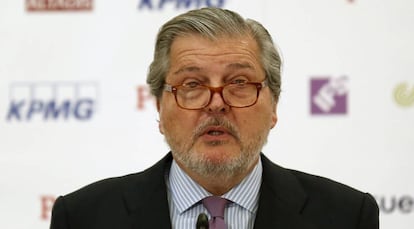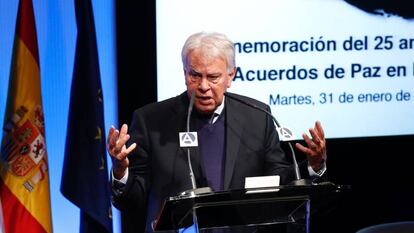Spanish government fails to speak out against Trump’s travel ban
PP spokesman opts for “making our principles clear, not shouting out nor being too strident”
Spain will maintain its bilateral relations with the United States, “making clear what our principles are, not shouting out nor being too strident.” That’s according to statements made on Tuesday by the Spanish government’s spokesperson, Íñigo Méndez de Vigo, who will be the main point of contact between Spain and the government of US President Donald Trump.

For his part, the Spanish foreign affairs minister, Alfonso Dastis, did not go much further into detail as to how Spain would approach the controversial new world leader, saying that relations with the United States must be “excellent,” adding that “among friends, things should be stated clearly,” and that this is the approach that will be taken with the new administration.
Some leaders from European Union countries have already voiced their criticism of one of the most controversial measures so far taken by Trump: an entry ban on citizens from seven countries, all of which have a majority Muslim population. France has called for a “firm response,” while Germany stated that the fight against terrorism “does not justify putting a people from a specific confession or past under general suspicion.” The United Kingdom, meanwhile, has opened lines of dialogue with the Trump presidency.
France has called for a “firm response,” while the UK has opened lines of dialogue with the Trump presidency
After three days of chaos at US airports in the wake of Trump’s executive order, and the criticism voiced from a number of different sectors in his own country, Spain has taken a less forceful position on the issue than other EU partners.
But Méndez de Vigo denied that Spain’s profile was “more discrete” than that of Germany, the UK or France.
“Right from the start we have maintained a clear position,” the government spokesman said at a breakfast meeting organized by news agency Europa Press in Madrid on Tuesday. He went on to explain that the Spanish government had called on Mexico and the US to rebuild their relations after the damage done by Trump’s announcement of the construction of a border wall that would separate both countries.
Méndez de Vigo went on to highlight the fact that it is very important for Spain to maintain good relations with its partners and allies. “The relationship with the US has not always been like this,” he said, in reference to the strained relations between the two countries when José Luis Rodríguez Zapatero, of the Socialist Party (PSOE), was prime minister – primarily due to the PSOE government’s opposition to the 2003 war in Iraq.
Méndez de Vigo, who is also the education and culture minister in the Spanish Cabinet, stated on Tuesday that “the best way” to behave with an ally is to speak to them “clearly and frankly,” both bilaterally as well as within the framework of the EU.
English version by Simon Hunter.
Ex-PM González: “There is too much international cowardice toward Trump”

Former Socialist Party (PSOE) Prime Minister Felipe González was critical on Tuesday of the response from other countries to the “radically mistaken” policies of Donald Trump. The political heavyweight described the measures taken by the new US president in his first week in office as based on “xenophobia, discrimination and white supremacy.
“I see too much international cowardice to respond to him,” the ex-PM said on Tuesday, citing as an example the threats made by the new US ambassador to the United Nations, Nikki Haley, who warned upon taking up her new position that she would be “taking names” of those from countries that don’t support President Trump.
Speaking during a conference at the Casa de América in Madrid, González, who was in power from 1982 to 1996, stated his “clear solidarity with Mexico,” whose relations with the US have already suffered since Trump came to power, and condemned the attitude of the Spanish government and that of other countries in terms of the new president.
“We need to confront Trump’s policies,” he said. “We can’t always be the keepers of the peace. The great danger is that this man feels he is above the law. Those who think that they are more skillful because they are being prudent are mistaken, because that prudence will be interpreted as submission or fear. At least my voice will be with the Latin America and Europe in which I believe, in the face of submission and fear,” the former leader added during an event to commemorate the 25th anniversary of the El Salvador peace accords.
Tu suscripción se está usando en otro dispositivo
¿Quieres añadir otro usuario a tu suscripción?
Si continúas leyendo en este dispositivo, no se podrá leer en el otro.
FlechaTu suscripción se está usando en otro dispositivo y solo puedes acceder a EL PAÍS desde un dispositivo a la vez.
Si quieres compartir tu cuenta, cambia tu suscripción a la modalidad Premium, así podrás añadir otro usuario. Cada uno accederá con su propia cuenta de email, lo que os permitirá personalizar vuestra experiencia en EL PAÍS.
¿Tienes una suscripción de empresa? Accede aquí para contratar más cuentas.
En el caso de no saber quién está usando tu cuenta, te recomendamos cambiar tu contraseña aquí.
Si decides continuar compartiendo tu cuenta, este mensaje se mostrará en tu dispositivo y en el de la otra persona que está usando tu cuenta de forma indefinida, afectando a tu experiencia de lectura. Puedes consultar aquí los términos y condiciones de la suscripción digital.









































